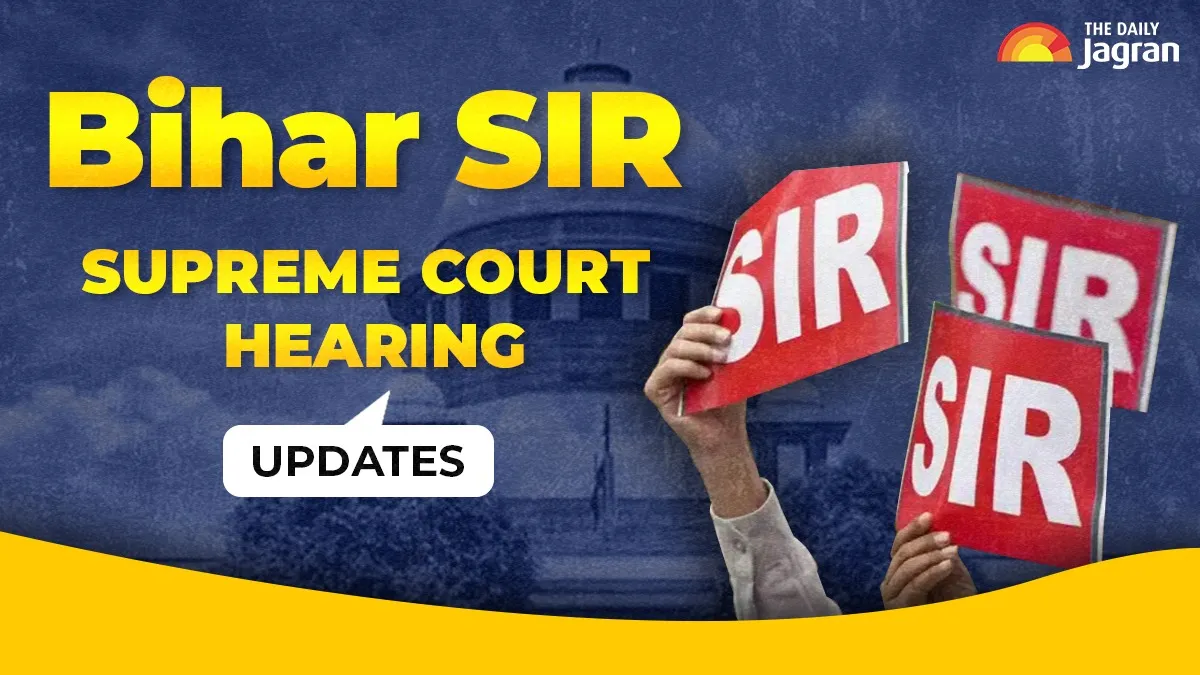- By Talibuddin Khan
- Wed, 13 Aug 2025 05:24 PM (IST)
- Source:JND
Bihar SIR Row SC Hearing Updates: The Supreme Court on Wednesday resumed the hearing on the batch of pleas challenging the Special Intensive Revision (SIR) of the Bihar electoral roll. A bench of Justices Surya Kant and Joymalya Bagchi began the hearing on pleas on Monday amid massive uproar by the opposition parties. The opposition has uestioned the timing of the SIR, given that Bihar will go to polls later this year, and alleged anomalies in the exercise.
Earlier on Tuesday, the Supreme Court observed that the opposition to the Bihar SIR was "largely a trust deficit issue" since the EC has claimed that roughly 6.5 crore people of the total 7.9 crore voting population in poll-bound Bihar didn't have to file any documents for them or their parents featured in the 2003 electoral rolls.
ALSO READ: What’s Behind Oppn MPs ‘124 NOT OUT’ T-Shirts During Bihar SIR Protest At Parliament?
The top court further backed the EC's view that Aadhaar Card and voter ID cards can't be accepted as a proof of citizenship in the SIR of voters' list in Bihar. The bench further observed that inclusion and exclusion of citizens or non-citizens from the electoral rolls was within the remit of the Election Commission.
Bihar SIR Row SC Hearing Updates August 13:
Abhishek Manu Singhvi's Submissions
- Singhvi further told the bench that in SIR every voter registered after 2003 is treated as presumptively excluded unless they prove otherwise. He said that SIR should be carried out over a year after the Bihar elections, as was done in earlier exercises, rather than in a matter of months. By the Commission’s own admission, Singhvi said, 65 lakh voters have been removed under the euphemism of "non-inclusion," which, without any process prescribed in the rules, labels lakhs as dead, permanently shifted or duplicates already enrolled elsewhere.
- Singhvi emphasised that no one disputes the Commission’s power to delete names, but it must be done strictly as per the prescribed process. Citing the 2004 example when Arunachal Pradesh and Maharashtra were exempted from similar revisions due to upcoming elections, he said this was a rare case where the Commission was not following its own rules.
- Calling the July rollout a "half-baked, ad hoc scheme" introduced just ahead of elections, Singhvi warned that exclusion from the voter roll amounted to "civil death." He said no one opposed revising electoral rolls, but the process should be conducted in December with adequate preparation time.
- The so-called list of 11 acceptable documents, Singhvi argued, was "a hollow pack of cards," with some irrelevant, some dubious, and others absent from many citizens' possession. He accused the Commission of a "clever sleight of hand" by presuming voters were off the rolls unless they proved otherwise, reversing established norms, and warned that completing the adjudicatory process in two months would be impossible without bypassing principles of natural justice.
- Singhvi said residents' certificates are virtually non-existent in Bihar, and that Form 6 for voter registration requires only self-declaration. He accused the Election Commission of a "mix-and-match" approach, combining documents from different categories without regard to how many people actually possess them.
- Senior advocate Abhishek Manu Singhvi, appearing for the petitioners challenging the Bihar SIR, argued that excluding Aadhaar from the list of acceptable identity documents was inherently exclusionary. Aadhaar, he pointed out, has enjoyed the widest coverage in the past 15 years, over 50–60% in Bihar, far higher than other IDs like water, electricity, or gas bills. By contrast, Indian passports cover barely 1–2% of the population, and most other listed IDs have only 0–3% coverage, with many being land-related and inaccessible to those without property.
Supreme Court's Observations
- The top court, during hearing on Wednesday, said that there the option to present 11 documents shows that the Bihar SIR is "voter friendly". The SC gave example of the previously conducted summary revision in which only seven documents were required to be submitted by an elector.
- The bench further said that despite petitioners' arguments that non-acceptance of Aadhaar was exclusionary, it appeared the large number of documents was "actually inclusionary". The top court noted electors were required to submit any one of the 11 documents in the list.
- "The number of documents in summary revision conducted earlier in the state was seven and in SIR it is 11, which shows it is voter friendly. We understand your arguments that non-acceptance of Aadhaar is exclusionary but a high number of documents is actually inclusionary," the bench said.
- The bench said the coverage of 36 lakh of passport holders in the state appears to be good. "The list of documents is prepared normally after taking feedback from various government departments to ensure maximum coverage," Justice Bagchi pointed out.
